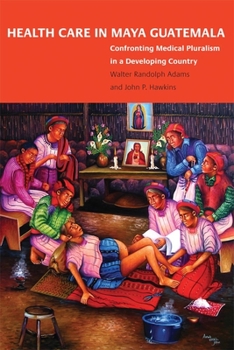Health Care in Maya Guatemala: Confronting Medical Pluralism in a Developing Country
Select Format
Select Condition 
Book Overview
When the traditional meets the modern, nowhere is the impact felt as personally as in the realm of health care. Because practitioners trained in Western science tend to ignore traditional medicine in developing countries, conflict is inevitable. Health Care in Maya Guatemala examines medical systems and institutions in three K'iche' Maya communities to reveal the conflicts between indigenous medical care and the Guatemalan biomedical system. The editors and contributors show how people in this rapidly modernizing society think about traditional practices-and reveal that health conditions in traditional communities deteriorate over time as long-standing medical practices erode in the face of Western encroachment. The contributors first consider cultural, institutional, and behavioral aspects of health care in Guatemala. Then they look closely at the nature and treatment of specific health issues, such as dentistry and mental health-especially depression. Finally they provide new insight on midwifery, nutrition, ethnomedicine, and other topics. As a whole, the volume proposes steps toward a health care system more accessible to Mayas, incorporating K'iche' concepts with Western thought. Representing trends seen throughout the world, it shows the necessity of cultural understanding if poor people are to have access to medicine that combines the best of both local tradition and international biomedicine. Although Western medicine continues to ignore the importance of local culture in its attempt to be "scientific," this book makes a strong argument for giving tradition its due.
Format:Paperback
Language:English
ISBN:0806138599
ISBN13:9780806138596
Release Date:November 2007
Publisher:University of Oklahoma Press
Length:292 Pages
Weight:1.04 lbs.
Dimensions:0.7" x 6.0" x 8.9"
Customer Reviews
1 rating
Confronting Medical Pluralism in a Developing Country
Published by Thriftbooks.com User , 17 years ago
Indigenous peoples around the world are at the center of many conflicts: natural resource management, intellectual property rights, sovereignty, identity, and health care to name just a few. In each country, and among each indigenous group, these conflicts differ. Adding to the complexity of each idiosyncratic conflict is the continued encroachment of non-indigenous (primarily Western) cultural practices, exacerbating specific situations for each indigenous group. The country and indigenous people of Guatemala are no exception to this mix - or emerging pluralism - of the old and the new, indigenous and non-indigenous, ancient and modern. Health Care in Maya Guatemala, the newly published book from the University of Oklahoma Press and edited by Walter Randolph Adams and John P. Hawkins highlights this contemporary dance of conflicts by specifically examining health care among the indigenous Maya peoples. Covering a range of issues effecting the indigenous Maya peoples of Guatemala - specifically three neighboring K'iche' Maya communities in the central west highlands - the book offers Central American specific examples of cultural, institutional, and behavioral health care perspectives. Further, the editors have made sure to include several chapters on specific aspects of the nature and treatment of various conditions, such as midwives, childbirth, development, dentistry, and depression. As such, the book is well rounded and encompassing, making it accessible to specialists, applied researchers, and interested or concerned individuals. Furthermore, because the chapters come from several years of field school programs held for advanced undergraduates, this book is an excellent text for medical anthropology courses. Much of the importance in the book, however, resides in the unique contribution to the larger medical and anthropological fields that it makes. For example, the book provides important indigenous perspectives to the Complementary and Alternative Medicine (CAM) debate. Here in the West we are enthralled with indigenous forms of medicine, methods of healing (including the body, mind, and spirit), biopharmacy, and anything alternative to the mainstream medical world. Health Care in Maya Guatemala, however, comes from the other perspective - that of the indigenous Maya peoples and their perspectives on Western versus traditional health care practices. Rather then framing its arguments in terms of the West cannibalizing Guatemalan Maya indigenous medical knowledge, it examines why indigenous people in Guatemala are neglecting their own ethnomedical knowledge (which works quite well), and instead willingly adopting many aspects of Western medicine. Through the use of short-term participant observation, informal interviews, and other standard anthropological methods, the process of this adoption are intricately captured. Not only are the shortcomings of Western medicine in a culture that has a different understanding of the patient/client ro





